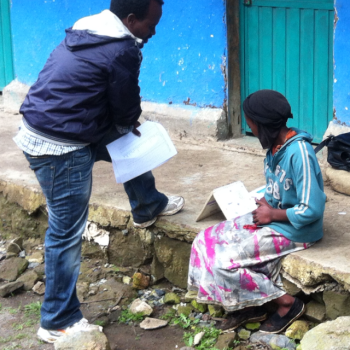
The fourth round of Young Lives longitudinal data is now available from the UK Data Service. It includes data from interviews with almost 12,000 children aged 12-13 (the Younger Cohort) and aged 18-19 (the Older Cohort) and their caregivers.
What’s new?
In this latest data release, the survey modules include:
Questionnaire for 12-13-year-old children: Schooling; Time-use; Health; Social networks; Feelings and attitudes; Peabody Picture Vocabulary Test, Mathematics test and Reading comprehension test.
Questionnaire for 18-19-year-olds: Parents and Caregiver update; Mobility; Subjective well-being; Education; Employment, earnings, and time-use; Feelings and attitudes; Household decision-making; Marital and living arrangements; Fertility; Anthropometry; Health and nutrition; Mathematics test and Reading comprehension test.
Household questionnaire: Parental background; Household and child education; Livelihoods and asset framework; Household food and non-food consumption and expenditure; Social capital; Economic changes and recent life history; Socio-economic status; Health; Anthropometry (for Younger Cohort child and a sibling); Caregiver perceptions and attitudes (Younger Cohort only).
Community Questionnaire: General characteristics of the locality; Social environment; Access to services; Economy; Local prices; Social protection; Educational services; Health services; Migration.
"The Young Lives data, with rich comparable longitudinal information across four developing countries on individual children, their families and the communities in which they live, is unique. … The many strengths of the Young Lives data include a prospective design with longitudinal follow ups, extensive multi-dimensional data, rich community information that permit investigating causal relations, low attrition rates and the use of common instruments and research methods in Asia, Africa and Latin America.”
Jere Behrman, William R. Kenan, Jr. Professor of Economics, University of Pennsylvania

The fourth round of Young Lives longitudinal data is now available from the UK Data Service. It includes data from interviews with almost 12,000 children aged 12-13 (the Younger Cohort) and aged 18-19 (the Older Cohort) and their caregivers.
What’s new?
In this latest data release, the survey modules include:
Questionnaire for 12-13-year-old children: Schooling; Time-use; Health; Social networks; Feelings and attitudes; Peabody Picture Vocabulary Test, Mathematics test and Reading comprehension test.
Questionnaire for 18-19-year-olds: Parents and Caregiver update; Mobility; Subjective well-being; Education; Employment, earnings, and time-use; Feelings and attitudes; Household decision-making; Marital and living arrangements; Fertility; Anthropometry; Health and nutrition; Mathematics test and Reading comprehension test.
Household questionnaire: Parental background; Household and child education; Livelihoods and asset framework; Household food and non-food consumption and expenditure; Social capital; Economic changes and recent life history; Socio-economic status; Health; Anthropometry (for Younger Cohort child and a sibling); Caregiver perceptions and attitudes (Younger Cohort only).
Community Questionnaire: General characteristics of the locality; Social environment; Access to services; Economy; Local prices; Social protection; Educational services; Health services; Migration.
"The Young Lives data, with rich comparable longitudinal information across four developing countries on individual children, their families and the communities in which they live, is unique. … The many strengths of the Young Lives data include a prospective design with longitudinal follow ups, extensive multi-dimensional data, rich community information that permit investigating causal relations, low attrition rates and the use of common instruments and research methods in Asia, Africa and Latin America.”
Jere Behrman, William R. Kenan, Jr. Professor of Economics, University of Pennsylvania

